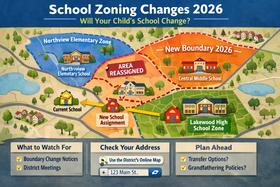Desert Mountain High School is a public high school in northeast Scottsdale, Arizona, which opened in the fall of 1995. It is the newest of five high schools in the Scottsdale Unified School District.
Evit - Desert Mountain High School ranks in the top 20% of all schools in Arizona for overall test scores (math proficiency is top 10%, and reading proficiency is top 30%).
The percentage of students achieving proficiency in math is 70-74% (which is higher than the Arizona state average of 45%). The percentage of students achieving proficiency in reading/language arts is 55-59% (which is higher than the Arizona state average of 45%).
Quick Facts (2025-26)
- School Type: Vocational school
- Grades: 9-12
- Math Proficiency: 70-74%
- Reading Proficiency: 55-59%
- Source: National Center for Education Statistics (NCES), AZ Dept. of Education
School Overview
School Type
Grades Offered
Grades 9-12
(No virtual instruction)
(No virtual instruction)
Total Students (11-12)
2 students
Total Classroom Teachers
93.70 (FTE)
Year Founded
1995
Colors
Grey, Maroon
Last Day of School
Mon. May 25, 2026
School Rankings
Math Test Scores (% Proficient)
(18-19)70-74%
45%
Reading/Language Arts Test Scores (% Proficient)
(18-19)55-59%
45%
Student-Teacher Ratio
21:1
17:1
American Indian
(11-12)n/a
5%
Asian
(11-12)50%
3%
Hispanic
(11-12)n/a
43%
Black
(11-12)n/a
5%
White
(11-12)50%
42%
Hawaiian
(11-12)n/a
n/a
Two or more races
(11-12)n/a
2%
School Statewide Testing
School District Name
Source: National Center for Education Statistics (NCES), AZ Dept. of Education
School Notes
- School Mascot: Wolf
Profile last updated: 02/09/2025
Frequently Asked Questions
What percent of students have achieved state testing proficiency in math and reading?
70-74% of students have achieved math proficiency (compared to the 45% AZ state average), while 55-59% of students have achieved reading proficiency (compared to the 45% AZ state average).
How many students attend Evit - Desert Mountain High School?
2 students attend Evit - Desert Mountain High School.
What is the racial composition of the student body?
50% of Evit - Desert Mountain High School students are Asian, and 50% of students are White.
What grades does Evit - Desert Mountain High School offer ?
Evit - Desert Mountain High School offers enrollment in grades 9-12 (No virtual instruction).
What school district is Evit - Desert Mountain High School part of?
Evit - Desert Mountain High School is part of East Valley Institute Of Technology (4516) School District.
In what neighborhood is Evit - Desert Mountain High School located?
Evit - Desert Mountain High School is located in the Central Scottsdale neighborhood of Scottsdale, AZ. There are 8 other public schools located in Central Scottsdale.
School Calendar
View the Evit - Desert Mountain High School yearly calendar below. Note key dates such as:
Event
Date
Spring Break
March 16, 2026 (Monday)
Last Day of School - Early Release (PreK-12)
May 22, 2026 (Friday)
School Reviews
Review Evit - Desert Mountain High School. Reviews should be a few sentences in length. Please include any comments on:
- Quality of academic programs, teachers, and facilities
- Availability of music, art, sports and other extracurricular activities
Recent Articles

Public School Open House & Enrollment Season Guide for Parents
Learn what to ask at a public school open house during enrollment season, from academics to safety, to choose the right school for your child.

School Zoning Changes 2026: How Assignments May Shift
School Zoning Changes 2026 could affect your child鈥檚 school assignment. Learn how zoning works, what is changing, and how families can prepare.

School Vouchers: Updated Pros and Cons (2025 Review)
Comprehensive 2025 analysis of school vouchers, weighing benefits and challenges for families, funding, outcomes, and policy directions.





